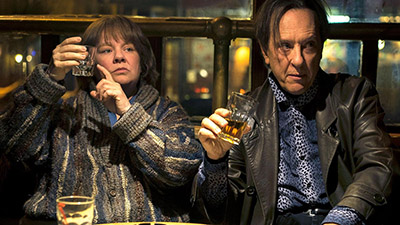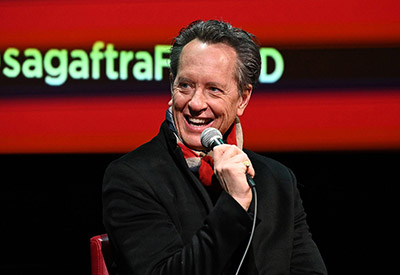Richard E. Grant Reveals Who His ‘Can You Ever Forgive Me?’ Character Is Based On
LogoTV.com – 21st January, 2019
By Michael Musto.

At a party for the film—where I simply engorged myself with shrimp cocktail, I swear—I got to sit down with the Swazi-British actor and chat about his characterization and the grizzly early days of the AIDS crisis. Every word was authenticated. [Spoilers Below]
Hello, Richard. Your character is at the end of his road, but I enjoyed that you brought such joie de vivre to him. He seems game for anything.
Thank you.
What was your inspiration for that?
Ian Charleson was a Scottish actor who played the Scottish runner in Chariots of Fire. We did a TV movie together called Codename: Kyril. My wife is Scottish—that provided an instant connection for us—and she coached him for his American accent in a production of Fool For Love. Ian developed AIDS and approached it with a combination of incredible boyish charm and salacious, louche decadence. I thought that combination was maybe something Jack could have. Ian wore a bandana on his head, so I thought I could do that when Jack is dying of AIDS. Ian knew he was dying. He was so young. His appetite for squeezing every last drop out of every day in case it was his last informed this part.
I feel like Jack is one of those giddy drunks who hide a lot of pain. But he wasn’t always so willfully carefree. Why did he end up turning on Lee Israel? Because he had to?
He was caught and being a coward. And he was somebody to save his own skin. He’d already been in jail for two years for holding a taxi driver at knifepoint. And he knew he had HIV and didn’t have much time left, and didn’t want to spend it in jail. So he gave her up. She’d had to use him to fence these letters. She expected four or five hundred dollars for them. He’d come back with $2,000. He had a talent for schmoozing in whatever part of town he was in.
Do you look like the real Jack at all?
He was tall, blond, American, and died at 47. I am 61, grey, and English. [Smiles]
 Slaven Vlasic/Getty Images
Slaven Vlasic/Getty ImagesWhen I tell young people about it, they say, “Are you being an actor about this?” No. A whole generation was wiped out. Do you know Sandra Bernhard?
Yes, since the ‘90s.
Me too. We did [the notorious flop film] Hudson Hawk together.
You’re brave to admit that.
Well, the good luck of that disaster is my lifelong friendship with Sandra. Once, I was going to visit Sandra and Isaac Mizrahi and I saw on the street people holding placards saying they had AIDS and had been abandoned by their jobs, abandoned by Medicare, and abandoned by their families. It’s literally a blink away in history. It was so shocking. An indelible memory.
It was so surreal, you had to be there to even believe it.
Rupert Everett expressed the notion that gay life has been normalized. He said, “You shouldn’t be mad at those kids.” And society has come so far. Would you have imagined same sex marriage?
No. When I was running around being gay in the ‘70s, for example, those rights weren’t even on the table yet. But now that the community has come forward, there are so many setbacks.
It’s always going forward. And you can’t stop it. Who you love is who you love.




